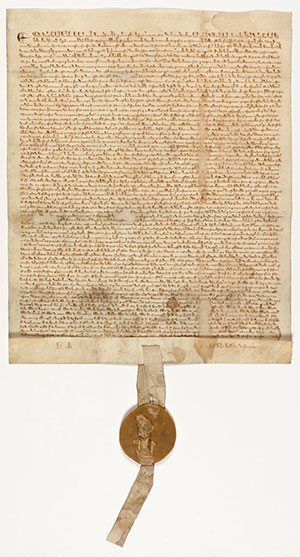
Magna Carta: The 800th AnniversaryBy DANNY TYREE June 03, 2015
*Sigh* In fact, Magna Carta (Latin for "Great Charter") is one of the most significant documents in history, drafted by the Archbishop of Canterbury to make peace between King John of England (infamous from the Robin Hood legends) and a group of rebel barons.
The provisions of the charter were agreed to on June 15, 1215 at Runnymede — meaning Magna Carta will soon be celebrating its 800th birthday. Too bad modern media didn't exist to record the goings on. The warring factions would have made for great pay-per-view. ("Putting the feud into feudal!!!") Of course one of the claims to fame of Magna Carta was that it was the first FORMAL document stating that a king had to follow the laws of the land. (Previous INFORMAL documents included, "Y'all ought not be doin' that kind'a stuff. What would your momma think, bless her heart?") Yes, Magna Carta declared unabashedly that the KING is not above the law. You'll find that as Number 7 in Barack Obama's book "10 Reasons Why I Wanted To Be PRESIDENT." If you think of Magna Carta at all, you probably think it has a long unbroken history. In fact, both sides violated it almost immediately, modified versions were issued in 1216, 1225 and 1297 (let's not even get into the XP, Vista and Magna Carta 8 versions) and only three of the 63 clauses still remain in English statute law. In fact, Pope Innocent III annulled the whole thing almost immediately, declaring that King John signed it under duress. ("If you don't stop making people do things under DURESS, I've saved a special corner of hell for you, where you will wail and gnash your teeth for all eternity....what are you rolling your eyes about?") Technically, John did not sign Magna Carta, instead affixing the royal seal (as was the custom). Historians did, however, find one copy wherein John tried to have the last word by inserting a handwritten "I'm rubber and you're glue..." We now take the provisions of Magna Carta (such as trial by jury and due process of law) for granted, but they were not originally intended for the common people. The barons were just looking out for themselves. In fact, one of the clauses in Magna Carta was that if the Crusades were successful, the Holy Land would be renamed One-Percenter Land. Magna Carta had a tremendous impact on the U.S. Constitution and Bill of Rights, the French Revolution and our current foreign aid and immigration policies. (No, wait — the latter two didn't come from the Great Charter. They were devised under the influence of OLD Charter.) Amazingly, after all these centuries, four of the 13 original copies of Magna Carta are still known to be in existence. Another four copies met a sad fate. Cheech and Chong bought them early in their careers and the vellum looked soooo much like ZigZag papers in the dim light... The British Library is conducting grand ceremonies for the anniversary. A mock trial for the barons is being held July 31. I wonder what the original participants would say if they could see us now? ("Y'all, we never said nothin' about a guaranteed right to drive on the wrong side of the road! What would your mommas think, bless their hearts?")
Distributed to subscribers
for publication by
|
|||
